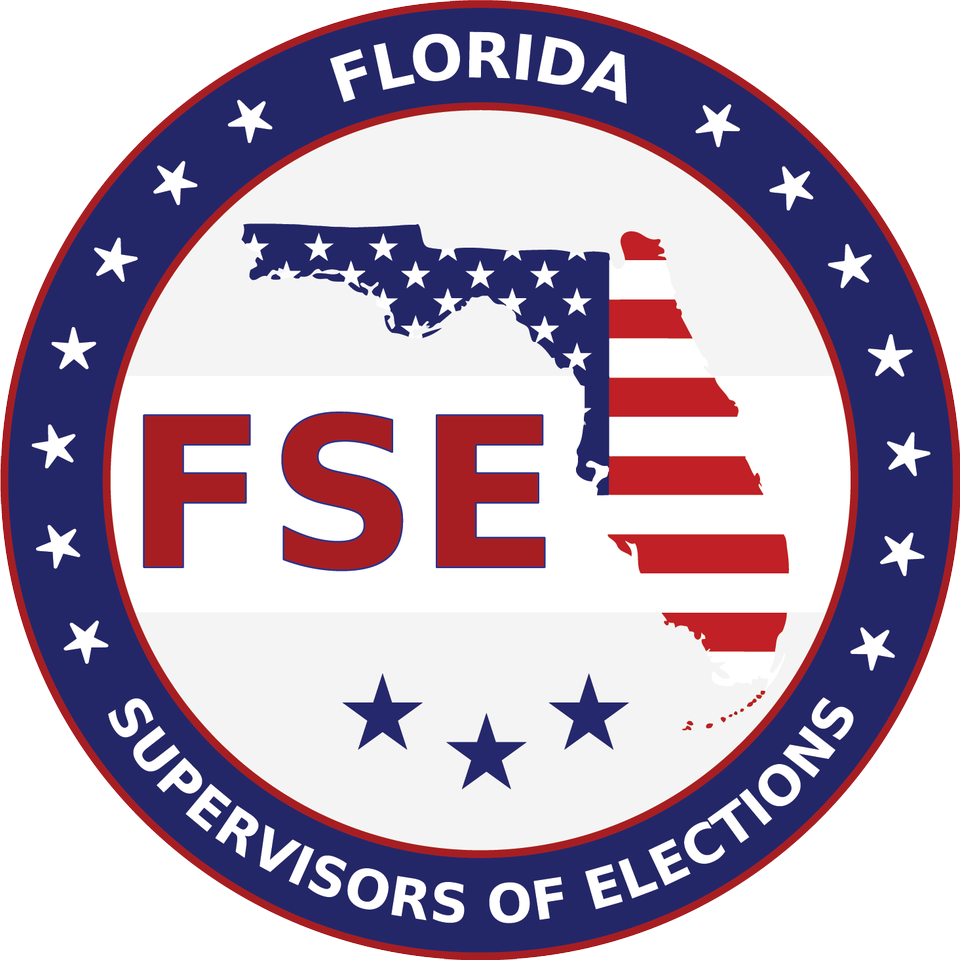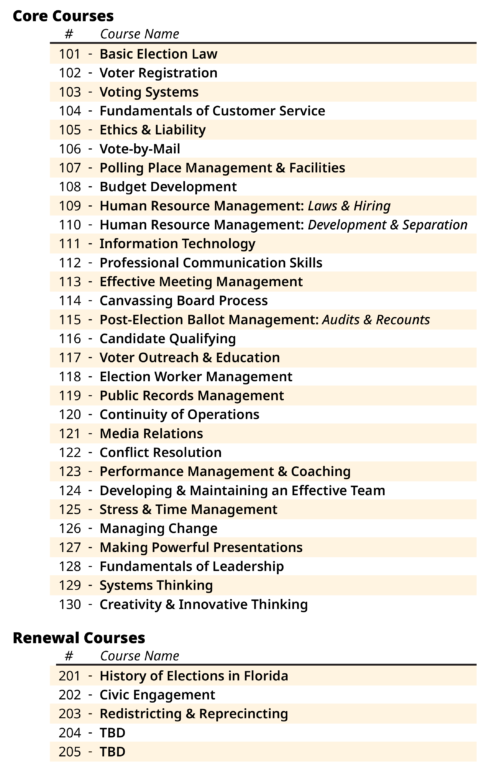May 10, 2023
Florida’s Certified Election Professional Program
The case study and guide are available for download:
How Florida Developed a National Model for Election Professional Certification
In Florida, election official certification is the formal recognition that an individual has met specific requirements for competence in administering elections. The state’s certification program was a grass-roots development led by election officials across the state. A few notable elections prompted a soul-searching review by Florida Supervisors of Elections, the elected officials responsible for administering local elections. This led to the development of a strategic plan and the creation of a formal certification program. Focus groups and surveys convinced the association’s education committee to develop a thorough program of 30 classes. While the Florida Certified Election Professional (FCEP) program remains optional for Florida supervisors, the program has an extensive waitlist and has received national recognition.

The Problem
Election officials are under growing pressure to prove their work and confirm processes. But that pressure is not a new phenomenon — just ask Florida election officials. Before the state’s professional certification program’s implementation, election officials in the state found themselves under the spotlight as the nation watched them recount punch card ballots to determine the next president of the United States.
Following the 2000 election, the U.S. Commission on Civil Rights didn’t mince words about its perception of Florida’s elections in a report:
“The state’s highest officials responsible for ensuring efficiency, uniformity, and fairness in the election failed to fulfill their responsibilities.”
– Report on Florida’s administration of the 2000 election cycle from the U.S. Commission on Civil Rights
The national attention and derogatory perception were not lost on Florida election officials.
“The FCEP program was created as a direct result of the 2000 Bush v. Gore recount in Florida. That tumultuous process made it clear that we were in a new age for elections, and we would forever after be under a political microscope. We understood that we needed a more professional approach if we were to succeed,” said Mark Earley, the Supervisor of Elections for Leon County and 2022-2023 President of the Florida Supervisors of Elections, the statewide association of election officials.
The Solution
In response to the criticism of election administration in their state, officials met with representatives of the Florida Institute of Government, which develops training programs and provides other assistance to government agencies. This group began to build and create the FCEP program.
“We began working on the program in 2005 and offered our first classes in 2009. We grew the program from that point to where it is today,” said former Collier County Supervisor of Elections Jennifer Edwards, co-founder of the certification program.
Vicki Davis, the Martin County Supervisor of Elections and another co-founder of the program, believes the program is essential for staff – particularly its networking and credentialing components.
“As a former school board member, continuing education has always been important to me personally and professionally. It is also important for staff to participate in elections training because it deepens their roots in the organization and broadens their perspective,” Davis said.
When they started the program, they had no idea how well it would be received and how valued it would become. Implementing a certification program with a curriculum specific to the profession and other general courses would strengthen participants’ election administration knowledge, leadership and management skills. The certification process would also reassure the public that election officials are professionals with expertise.
Their goals and objectives for the certification program were to:
-
Promote conformity with best practices statewide
-
Encourage sharing of ideas, issues, challenges and processes
-
Increase the knowledge and skills of participants
-
Increase voter confidence
-
Provide high-quality courses at an affordable price
-
Incentivize election officials and their staff to become certified
The demand for classes and the level of participation continues to grow at a pace that has caused the organizers to expand the number of locations offering courses throughout the state.
Obstacles and Advice
The most significant obstacles were finances, information gathering and curriculum creation.
An initial loan from the Florida Supervisors of Elections state organization provided the seed money that allowed the establishment of the FCEP program until it could be self-sustaining.
Information gathering and course creation took time and required assistance from the Florida Institute of Government. Time was spent contacting other groups with a certification process and researching how to run a program successfully. Once the association’s education committee completed the information gathering, they used the feedback to develop the program and curriculum. The process to reach 30 classes was a six-year undertaking.
Like many instances of change, there was some initial pushback from some stakeholders who the program would impact. However, the organizers noted that once a concrete plan was developed, those who initially doubted the program fully supported the certification program.
Costs and Funding
With the approval of its executive committee, the Florida Supervisors of Elections organization used $50,000 from their general fund to kickstart the certification program. The chair of the state association’s education committee led the mission of creating the program.
The FCEP funds were partly used to develop FCEP courses – a function the Florida Institute of Government performed. Additionally, funds were used to pay support staff, who handle registrations, website information and communications with members.
The program was an immediate success. FCEP generated registrations so quickly that it could recoup the initial cost in just a few years. Program leaders kept costs low by holding course sessions at supervisors’ offices rather than paying for space at convention centers. This approach has allowed the FCEP to keep registration fees for each class to $90 per person.
At the beginning of the program, supervisors and staff volunteered to teach and present. Only outside instructors were paid. They now pay all speakers, including consultants, supervisors and staff.
Infrastructure Needs
Having an organization or institution help oversee and administer the process was critical to the program’s success. The Florida Institute of Government provides organizational and clerical support.
Curriculum
To develop the initial curriculum, the Florida Institute of Government conducted surveys and focus groups with supervisors across the state. The institute asked election officials what education programs would help them do their jobs better, what topics they needed to know more about, and what factors should be considered when determining the logistics.
The first classes focused on election law and topics like human resources and professional development. The committee has agreed on 30 core courses related to election procedures, leadership development, and media relations. The peer-to-peer learning and engaging, enjoyable programming hook the students.
“Staff comes back [from classes], and they have a new energy,” said Lori Edwards, the Polk County Supervisor of Elections. “They want to tell people about their experiences. The classes are important to them. They enjoy learning from each other and the instructors.”
The classes are typically four hours in length, comprising a mix of classroom content, workbooks, activities and small group discussions. The exercises are practical and often based on real-life experiences.
The classes are updated and added to reflect statutory changes or to respond to what is happening in elections. Some realignments occurred along the way with class levels, sequences and groupings. The following courses are core courses and renewal courses:

To obtain the Master Florida Certified Election Professional/Vendor (MFCEP/MFCEV) designation, participants must complete the 30 core FCEP courses, participate in a statewide primary and general election cycle, and apply for graduation. The courses do not have to be taken in any particular order. Participants are offered 20 different core courses in odd years during four program sessions, with five core courses offered in each session.
As a member of the first graduating class to receive MFCEP certification, Marion County Supervisor of Elections Wesley Wilcox spoke of the value of the FCEP courses as “a tremendous asset to both Florida Supervisors and team members, allowing students to obtain a well rounded Florida Elections centric knowledge base in a relatively short amount of time, thus allowing us to better serve our constituents.”
Individuals must renew their certification every two years by taking one four-hour renewal course. Maintaining the certification is one way supervisors of elections can qualify for an annual $2,000 special qualification salary supplement – specifically provided for in Florida law.
Certification can continue to be renewed for life, even once someone has retired or moved on to another position or community. Currently, renewal courses focus on the history of Florida elections, civic engagement, and redistricting and re-precincting.
In addition to offering certification to election officials, the FCEP allows vendors to become certified. Vendors who choose to seek certification complete the same 30 classes as election officials.
Target Audience
The certification program is open to Florida Supervisors of Elections, their staff, public officials responsible for election-related duties, and election vendors.
Impact
Anne Schroeder, co-coordinator of the FCEP Program shared, “The program is still highly in demand due to practical content including best practices. We often hear that completing all 30 courses provides an excellent overview on implementing a major election when all hands on deck are required.”
The quality of the curriculum and instructors has resulted in statewide standards and best practices. Plus, the impact is evident in public perception of and confidence in Florida’s election processes and outcomes.
From the association leadership, deep into ranks in Supervisors’ offices, the rigorous approach to professional administration of elections is evident.
“The entire world is watching,” as Florida conducts elections in a litigious and contentious environment, said Earley, who was elected in 2016 but has worked in election administration for more than 30 years.
But through training, Earley continued, the Supervisors “meet the high standards required of neutral election administrators in the modern elections arena.“
Consistency in practice, continuous improvement, and shared perspective has increased public trust. Florida supervisors are able to speak to the press with confidence and address legislators with authority they’ve earned, which helps them shape legislation.

In 2015, the FCEP program was awarded the Professional Practice Award from the Election Center and in 2016, the FCEP program was awarded the Eagle Award from IGO (formerly known as IACREOT).
“Our reputation as professionally trained, neutral elections administrators allows our voice to be heard and trusted by voters, the press, activists, and legislators during the politically fraught process of crafting election law and administering elections,” concluded Earley.
Scalability
While Florida is a large state and home to over 14 million registered voters across 67 counties, the program’s model is scalable and can be implemented by both larger and smaller jurisdictions – at the state or local level – by completing the following steps:
-
Build a working group in collaboration with your state association or state elections office or both.
-
Choose a training framework that works for your state
a. Range of topics
b. Intensity of course work
c. Venues – online, in-person or hybrid
-
Establish program administration and oversight.
-
Develop engaging and informative class materials and efficient administrative tools.
Conclusion
There are many benefits to adopting a certification model like Florida’s. The election officials learn uniform practices and procedures for conducting elections, and the courses provide an opportunity for increased camaraderie, networking, collaboration, and support. Many election officials come into their roles from backgrounds outside of election administration. FCEP gives a well-rounded experience in elections, teaching all aspects of mail ballot processing, voting equipment, candidate management, election law, and voter registration. It helps officials gain an understanding of how all of the pieces work together.
“You get to know others and realize you are not on an island. They are having the same challenges. You can talk them through,” Sonya Daniel, the Deputy Supervisor of Elections for Escambia County, said. “You have all these resources and tips you wouldn’t have had without the experience. It expands your ability to do your job better.”
Perhaps most importantly, certification provides an added level of trust and confidence for voters and candidates that certified election officials are administering Florida elections. Their award-winning and nationally recognized program is impactful, in demand, affordable for all, and has the potential to be duplicated in other states.



